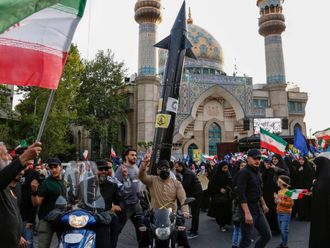Cairo: The two houses of the Egyptian parliament this week approved a controversial bill, allocating 64 seats in the legislature for women, a move that has drawn mixed responses in this conservative Muslim country.
According to the bill, forwarded by President Hosni Mubarak's National Democratic Party, 32 new constituencies, comprising two seats each, will be created nationwide to accept applications for running for the parliament from women only. The amendment will take effect starting from Egypt's elections due next year for at least two legislative elections.
Officials in the ruling party say the quota, which increases the number of seats in the Peoples Assembly (the lower house of the parliament) to 518, is aimed at empowering women in Egypt. They add that the new law would eventually enable women to independently run against male candidates in elections and win.
This legislation is a practical implementation of President Hosni Mubarak's election programme and the constitutional amendments approved in 2007, said Majdi Radi, the spokesman for the government.
The term ‘women's empowerment' is part of a Western agenda promoted by pro-women groups, which receive foreign funds, said independent MP Mohammad Al Omda. This law is unconstitutional, added Al Omda, who was one of 96 deputies, who opposed the bill in the legislature, where the ruling party has a vast majority.
Very few women won in Egypt's latest legislative elections in 2005, a fact that prompted Mubarak to use his constitutional right to appoint more women in the parliament.
Many countries allocate seats in the parliament for women. This is a sort of positive discrimination, said Fawzia Abdul Sattar, an ex-legal advisor to the legislature. She denied in remarks to Gulf News that the quota violates the Egyptian constitution.
Paragraph two of Article 62 of the constitution, which was amended in 2007, stipulates that women should get fair representation in the parliament.
Egypt's women presently account for 2 per cent of representation in the parliament. This bill exposes constitutional inconsistency, said Amr Hesham, an expert at the State-run Al Ahram Centre for Political and Strategic Studies.
While the Constitution enshrines equality among all citizens, the amended Article 62 approves the right to allocating seats for women in the parliament. This allocation is tantamount to a humiliating distinction for women. What we really needs is to change the culture of the male-dominated Egyptian society, not the law.
In Hesham's view, if the women's quota was suspended after implementing it in several elections, the situation would be back to the status quo. Men would not elect women, because they do not trust them as reliable decision-makers. Education and media should be used in changing this negative perception.
Egypt approves parliament quota for women amidst protests
Egypt approves parliament quota for women amidst protests













